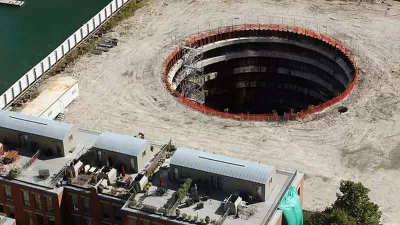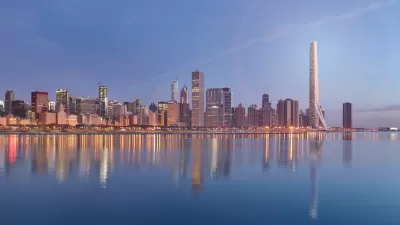The high-water marks showing where the last boom broke under the pressure of the Great Recession are still visible in cities all over the country. The Chicago Tribune recently checked on a particularly poignant example in Chicago.

Kim Janssen checks in on the hole in the ground that almost became the Chicago Spire skyscraper, and the second-tallest building in the world after the Burj Khalifa.
After the Great Recession forced Spire developer Garrett Kelleher to halt construction with only a 76-foot-deep hole that would have been the building's foundation to show, the property has since changed hands and not much else.
Janssen reports, however, that "[w]orkers last week started moving dirt to form a landscaped berm that will block the view of the 110-foot diameter hole from a row of 10 Streeterville row homes on the 400 block of East Water Street." The camouflage effort was followed by a communication from current owners the Related Midwest announcing, in effect, that there's nothing to see, or expect, at the Spire.
FULL STORY: After 2,000-foot dream dashed, Chicago Spire's remains to be hidden behind dirt mound

Maui's Vacation Rental Debate Turns Ugly
Verbal attacks, misinformation campaigns and fistfights plague a high-stakes debate to convert thousands of vacation rentals into long-term housing.

Planetizen Federal Action Tracker
A weekly monitor of how Trump’s orders and actions are impacting planners and planning in America.

In Urban Planning, AI Prompting Could be the New Design Thinking
Creativity has long been key to great urban design. What if we see AI as our new creative partner?

King County Supportive Housing Program Offers Hope for Unhoused Residents
The county is taking a ‘Housing First’ approach that prioritizes getting people into housing, then offering wraparound supportive services.

Researchers Use AI to Get Clearer Picture of US Housing
Analysts are using artificial intelligence to supercharge their research by allowing them to comb through data faster. Though these AI tools can be error prone, they save time and housing researchers are optimistic about the future.

Making Shared Micromobility More Inclusive
Cities and shared mobility system operators can do more to include people with disabilities in planning and operations, per a new report.
Urban Design for Planners 1: Software Tools
This six-course series explores essential urban design concepts using open source software and equips planners with the tools they need to participate fully in the urban design process.
Planning for Universal Design
Learn the tools for implementing Universal Design in planning regulations.
planning NEXT
Appalachian Highlands Housing Partners
Mpact (founded as Rail~Volution)
City of Camden Redevelopment Agency
City of Astoria
City of Portland
City of Laramie




























